We spoke to the writers Jimmy McGovern and Helen Black about developing and writing the second series of the prison-set drama Time.
Watch Time on ±«Óãtv One from Sunday 29th October at 9pm or on ±«Óãtv iPlayer
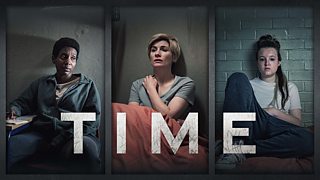
Can you tell us about the premise of Time Series 2 and how it relates to Series 1?
Jimmy McGovern: It’s very different from series one because life is very different inside a women's prison. I am probably speaking out of turn here, but I think it's less imprisoning and restrictive than it is inside a men's prison. You go into a men's prison and it would not be unusual to find men who are banged up for twenty-three hours out of twenty-four. That’s not quite the case inside a women's prison.
Inside a men's prison, you very much see wings. You know, the old stone walls and cell doors all the way down, a hundred yards or so. It’s very hard to find that inside a women's prison. You might find the odd wing, which is for induction and maybe punitive sort of terms, but the women will tend to live inside a unit, fifteen, twenty, thirty women inside the household units, often with access to a kitchen and showers and things. The front door is always locked, of course, until they're allowed out.
The biggest difference of all is that men are quite suspicious inside the men's prison. When you go in there and talk to them, they want to know what's in it for you. Inside a women's prison in general they’re quite prepared to talk, because you're from the outside and they can tell you their story and they will. So, it will look different, it will sound different, but it is about imprisonment.
Watch a short trailer for Time Series 2
How has that affected the stories you’re able to tell this time?
Inside a women's prison (not all women's prisons, but in our prison in Time) there's an MBU, a mother and baby unit. So, I mean, you get nothing like that inside the men's prison. A man would have no access to his kids except when the kids come to visit. Inside a women's prison you can rear your baby. You can be pregnant in that prison and give birth to your baby and have your baby with you usually up to about the age of around 18 months.
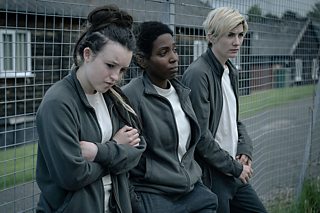
Kelsey (BELLA RAMSEY), Abi (TAMARA LAWRANCE), Orla (JODIE WHITTAKER) in Time (Credit: ±«Óãtv/Sally Mais)
Could you introduce us to the central three characters in Time Series 2?
There’s Orla (played by Jodie Whittaker) who's in for a short sentence. And that asks the question, are short sentences any good? There's Kelsey (Bella Ramsey) who comes in under the influence of heroin, but it's not the story of a heroin addict having to come to terms with not having heroin because you can get heroin inside a British prison unfortunately.
And there's Abi (Tamara Lawrance), who has committed what many people would say was an unforgivable offence. And we tell her story of how she comes to terms with that unforgivable offence, but also how the other women have to come to terms with it as well.
They’re the three stories, but there are other stories as well. There's a nice restorative justice theme, stories of the chaplain, you know, who's played by Siobhan Finneran.
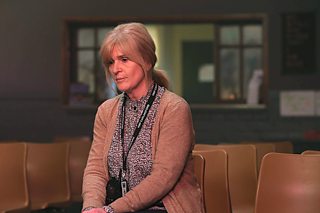
Marie-Louise O'Dell (SIOBHAN FINNERAN) in Time (Credit: ±«Óãtv/Sally Mais)
What is it about the prison precinct that is so effective for storytelling?
It's different in the women's prison from the male prison. But in both there's the very strong notion that you do not grass. Anywhere else if somebody was doing something nasty to you, if somebody was making your life hell, you would simply inform, you would tell a supervisor or an officer or anybody further up the pecking order, the chain of command, that this was happening, and it would be stopped. But you do not do that in prison. If you did do that, your life would be worse, you know? So that's the most interesting thing for me. I think, you know, you strip away things and you become the person you are, almost naked, you have to stand up for yourself in this very strange environment and protect yourself. That's not easily done.

Jimmy McGovern
Do you look back on your early career in TV as a kind of apprenticeship?
Yes it was. I remember the first six months of when I didn't know anything, and I just did exactly as I was told to do by people who'd written for television and I hadn't written anything so of course they knew more than me. I did as I as I was told, and it was dead. Everything I wrote was dead. It took a while for me to invest something of myself in that story, to take a story I was being told to tell but tell that story in my way and inform it with my attitude towards life, my own voice, and become those characters one hundred percent. You need to become those characters and face the situations they are facing, totally concentrating on that and giving of myself, you know.
It took me a while to learn that, and you've got to learn that because if you don't, then you're no longer a writer, you're a secretary. You're jotting down notes that the producer or the main writer is giving you and slavishly following those notes. That's secretarial. That's not creative in any way. How you listen and still own your story is a big test for any writer. You've got to listen. You know.
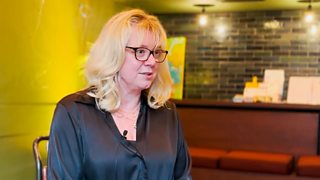
Helen Black
How did you end up working on Time Series 2?
Helen Black: So I was on holiday and told by my agent not to pick up my emails, to have a break. But then I saw that she had e-mailed me! So I picked it up and it said, Jimmy McGovern wants to write series two of Time set in a women's prison, and he'd like a female co-writer and would I like to have that conversation with him in Liverpool? So I said, Yes, I would like that conversation! So I went up to meet him and then he asked me to come on board and we wrote it.
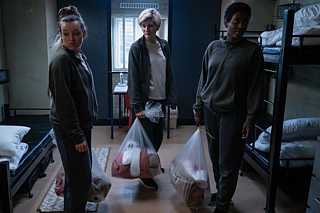
Kelsey (BELLA RAMSEY), Orla (JODIE WHITTAKER), Abi (TAMARA LAWRANCE) in Time (Credit: ±«Óãtv/Sally Mais)
What was the writing process for Time Series 2? How did that partnership work?
Well, we spent a fair bit of time together. Not in a typical writers’ room, no white boards, nothing that you would see in the other writers’ rooms that I've been in. We were just in a little quiet, dark room above Radio Merseyside, and we would just talk with our producers about what it might be. Jimmy had some ideas, some strong feelings about what he wanted to say.
And then I told him all my experiences and then we went to visit HMP Styal, part of the women's estate. And then eventually, when you can't put it off anymore, Jimmy wrote episode one, I wrote episode two, and then we switched. And then we kept switching until we were in a position that we were happy with. And then, of course, you get the production notes down the line. So that was pretty much the process.
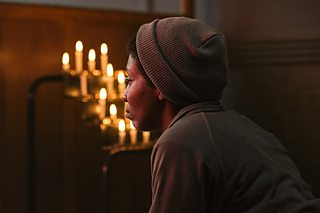
Abi (TAMARA LAWRANCE) in Time (Credit: ±«Óãtv/Sally Mais)
Was the setting of Time a world that you were familiar with?
Yes, because when I was a lawyer, I was visiting prisons quite regularly, so I didn't feel uncomfortable visiting jails at all. And I'm from a very working-class background, so just writing about ordinary people felt like an easy and comfortable place for me to be.
You started your writing career as a novelist before writing television. What’s the most surprising thing that you have found out about writing for television?
That ninety-nine percent of it never gets made! Whereas when you write a book, you write a book. And if you're already under contract there will be a book. It might not do brilliantly, but there will be a book.
In TV you can be under contract to a producer. You can be under contract with a broadcaster. You can be virtually filming and it can still get axed at any time. And I think that's something that new writers need to know - that having something in development is just a start. There's no promise, but you just have to approach it as if it will get made and it's going to be bloody brilliant. Otherwise, you won't enjoy the process. You might just get a bit cynical and jaded. And so, I would say, just imagine in your mind that this is going to get made and how fantastic that will feel when it's on telly.
Read the scripts for the first series of Time in our script library
